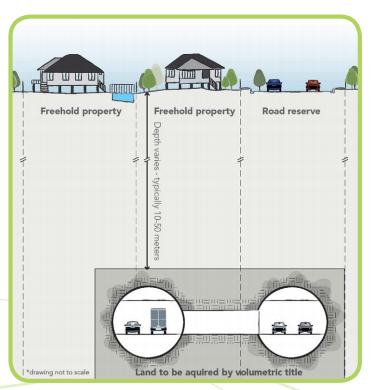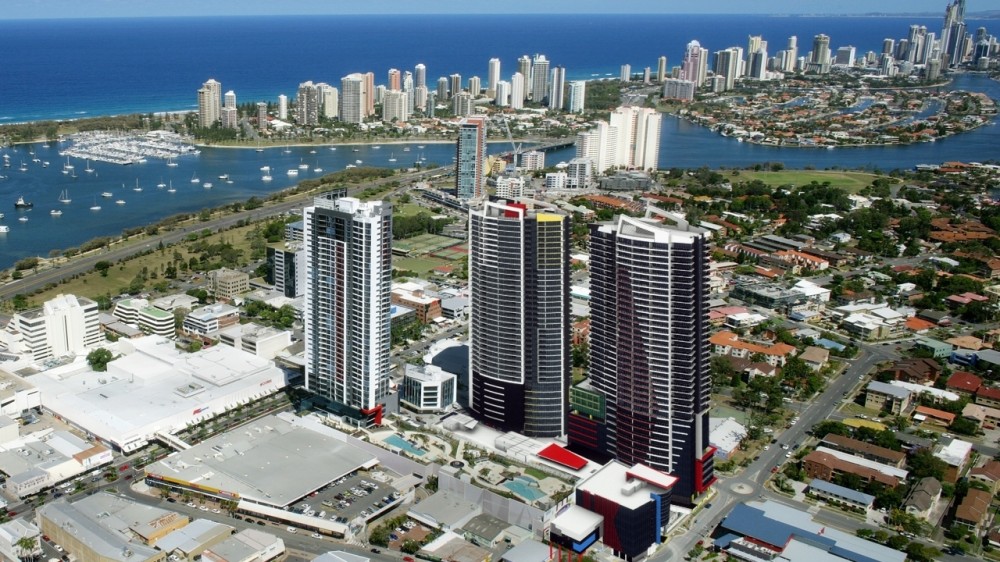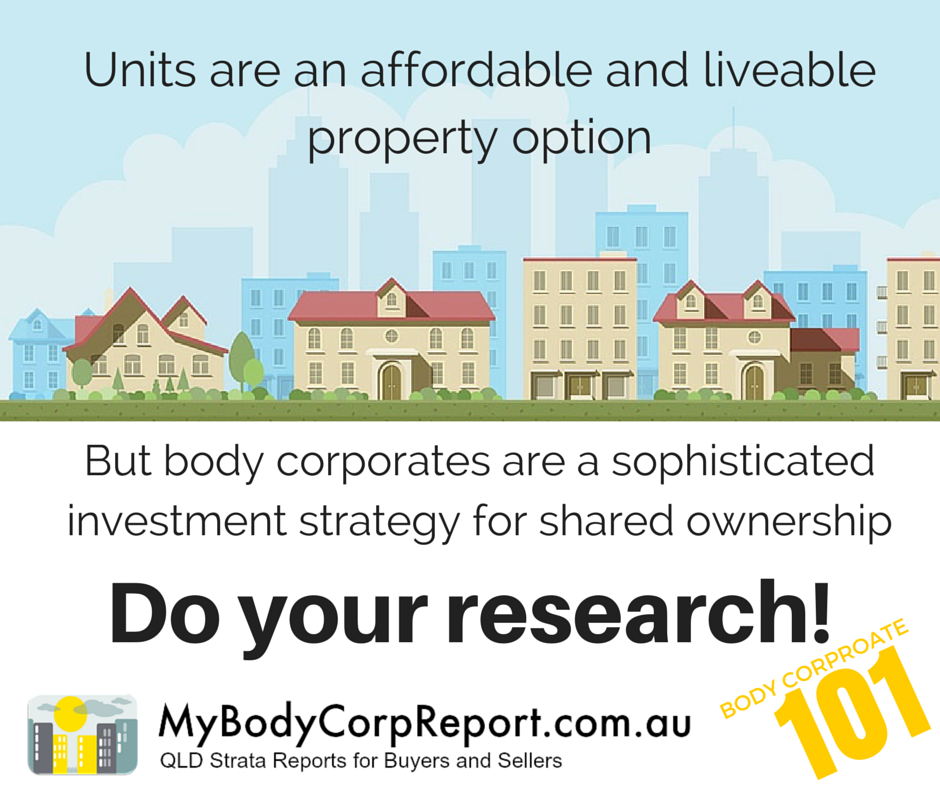A Building Management Statement (BMS) is a document that governs how shared facilities are accessed, maintained and funded.
That’s a fairly simplistic definition of something that is very complex. A BMS must be registered over at least two lots, at least one of which must be a volumetric lot.
What is a volumetric lot?
Our land titles system gives us ownership of our land, being all the space on the surface of the earth, all the space underneath to the earth’s core and space above into … um, well, space.
You can actually sell the air space above or subspace below your lot. The new lot that’s created from your sub or air space is called a volumetric lot.
That may sound a little far-fetched but it happens all the time. A recent example is Brisbane City’s resumption of land to build the Northern Link Tunnel. They did of course resume whole lots, but also volumetric lots below existing lots. Click here to read their great explanation of volumetric lots.
How does this affect body corporates?
The most common volumetric lots that you see in everyday life are residential or hotel towers built above retail or office precincts.
In effect it’s a bit like building with blocks. On the bottom is the retail, then office, then residential, all neatly stacked. Underneath there may be a basement car park shared by all entities.
And that’s the key point: they are all separate entities.
A good example here on the Gold Coast is Southport Central.
Southport Central is three large towers and two subsidiary buildings built on the site of the old Southport school.
The precinct consists of three body corporates; Southport Central Residential, Southport Central Commercial and Southport Central Retail. There’s also Southport Central Building Management Group, but I’ll come back to that later.
Each of the three towers contains a portion of each of the three body corporates; retail has shops with offices above them and apartments on top, all stacked neatly above the shared basement.
Shared Facilities
Building Management Statements are used when there are shared facilities. Shared facilities would be things like shared access ways, stairs, elevators, water supplies, fire safety equipment and so on.
In the case of Southport Central there is a large open plan access way around and between the buildings. There are numerous stairwells, each building has shared elevators, all sorts of things.
Gary Bugden in his report All About Strata and Building Management Statements and Building Management Committees notes
Inevitably, these shared facilities are located within one of the component use areas. However, because they are used by two or more areas, there is a need to ensure that they are properly maintained and that the cost of that maintenance is shared fairly by those who use them.
Who pays for what?
The crux of a BMS, other than ensuring access, is to set out who is responsible for paying what toward the upkeep of the shared facilities.
Certain elements of any complex building will benefit one portion more readily than another. For instance grease traps would almost exclusively be a retail cost, since that is where restaurants and cafes would be situated. Conversely elevators would almost never be used by retail who have no need to access the building proper.
As you can imagine calculating who pays for what is complex and ripe for disagreements.
Developers circumvent the whole process by calculating all these items ahead of time and then registering the Building Management Statement before lots are settled.
Building management group
When a BMS is registered it immediately creates a building management group made up of all the lot owners, or an appointee in the case of a body corporate, who are tasked with maintaining and co-ordinating the shared facilities.
The building management group usually issue and pay levies, of a type, and have accounts where they accumulate funds similar to how a body corporate is managed.
It’s important to note however that a BMS operates under the Land Act. The building management group it creates is not associated with body corporates at all, notwithstanding a scheme may be a member of the group.
What impact does a BMS have on lot owners?
If a body corporate is subject to a BMS the projected costs are included in the yearly budgets and are recovered from lot owners via their regular levy payments the same as every other expense.
Otherwise most owners will never even know about the BMS.
I have seen some BMS costs, usually for grease traps or air conditioning, recovered directly from retail lot owners. Those costs are issued as a statement from the body corporate to the lot owner, the same as any monetary liability is recovered.
For the most part a BMS is something that operates in the background of a complex building and has little effect on lot owners.
Of course it’s a different story if you’re on the committee.

 Unless stated otherwise all the information on this website relates to Queensland legislation.
Unless stated otherwise all the information on this website relates to Queensland legislation.
Can you Please assist with information on how a BC member is elected to be the BC representative on the BMS? Our BC has 10 votes as residential owners and their are 10 other retail Lots forming the BMG. We have a committee member who is self appointed as the BC BMS representative. Is A general Meeting required to vote on an ordinary resolution to appoint a Bc Representaive on The BMS? I would appreciate any assistance regarding this matter.thank you.
Hi Barbara
You need to refer to the BMS which should outline how the representative is elected. If it’s not noted then check your by-laws to see if its mentioned. If not then the default is usually Chairperson but the committee may resolve to elect someone else, subject to BMS and by-laws.
Hi Lisa
I live in a building of 7 floors hotel and 6 floors residential. The hotel send us an invoice every month for BMS expenses but doesn’t have invoices to justify the figure. Are they required to prove the expenses?
Hi Steph
Have you asked the Hotel to provide invoices? If not, that is probably the place to start.
If they’re refusing you’d have to refer to the Building Management Statement to see what it says. It may specifically allow the hotel to ‘demand’ payment. It might also set out what is being claimed.
Also check the provisions about dispute resolution. It seems quite reasonable to me to want to see invoices and if they refuse to provide then the dispute resolution procedures might need to be implemented.
We have a BMS and as it is time for the budget meeting is it a requirement for both the representatives from Commercial lot and Residential lot to be financial. I cannot see anywhere in the Building Management statement that refers to this although there is a half page on strict rules on funds owing. What would be your thoughtson this thank you
Hi Sandra
The BMS is contract law rather than body corporate law, though at least one lot must be a body corporate. Whatever is in the document is likely going to apply.
I don’t know of any requirement for lots to be financial. Usually one party, usually the body corporate, covers costs and seeks reimbursement. It is awfully common to have to do that via QCAT or Magistrates Court.
Hello, with changes to a BMS, it is usually stated that changes to a BMS is via in part, a vote without dissent, is this a vote carried out by all lot owners with the CMS component after the changes are requested by the BMS group?
Or can the Body Corporate Committee themselves vote to change a BMS without consulting lot owners?
Point in question is our building has 144 lots under the CMS (residential) and 3 commercial lots under the BMS, the Body Corporate Committee, consists of two members who directly are connected to the Commercial lots and have decided that they, the Committee members themselves can change the BMS without consulting any residential lot owners.
Their latest change is to allocate common property forming part of the CMS to the use of the BMS, this being a fire exit to be granted to the use of the commercial lots as a car park.
Hi Tony
Amending a BMS is similar to changing the by-laws of the body corporate. It must be done by owners in general meeting. Further it should be a special resolution.
So yes, this is a restricted issue for committee. They cannot simply make changes. In fact, even if the owners and BMG lots agree the changes don’t take effect until the new BMS is registered.
Allocation of common property is a different thing again. An allocation of common property should be voted on by resolution without dissent, same as making an exclusive use allocation. Alternatively an occupation authority may be done by an ordinary resolution but again by owners. But then you would need a formal agreement that’s circulated to owners. This agreement would set out terms, as it for amount of time and subject to conditions. An Exclusive use grant is investing the value of said common property in the lot until released by resolution without dissent.
Also … a fire exit is a fire exit. If its designated as an exit it will need to be kept clear. This is questionable.
Hello Lisa, thank you again for your valuable website.
Our BMS represents 10 retail (Lots 1 to 10) and Lot 11 is the the Residential Lot
I have cut and pasted directly from the BMS that controls our CTS and BMS the following:
Page 4 of the BMS 4S 1.1 (aa) Representative means a natural person appointed
by an Owner to represent the Owner on the Committee.
Page 3 of the BMS S. 1,1 (t)(t) Owner means the Owner of each Lot.
Where any Lot is scheme land for a community titles scheme
Page 8 of the BMS S 2.1 (a&b)
defines the scheme as being 10 retail lots and 129 residential units plus the common area
Page 11 of the BMS 4.3 (a) Each Owner must appoint one (1)
Representative to represent it at Committee meetings.
Page 11 of the BMS 4.3 (d) Each Owner must ensure that its
Representative or alternate Representative attends meetings of the Committee
and acts in a manner that allows the Committee to discharge its functions.
To me, as a lay person, I believe that a BC representative would be required to be elected
at a general meeting of the CTS. Would appreciate your advise on this one.
With regards and thank you again
Please note my new email address below
Hi Barbara
I’m not sure about this question. Its not something that comes up a lot. Check your by-laws and the BMS. For principal bodies corporate legislation allows the committee to select a representative, or, if none is selected, its automatically the Chairperson.
That can be amended by your scheme however. BMS stuff is more of contract law than body corporate because, as you’ve noted, many of the lots involved aren’t strata schemes.